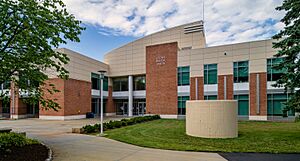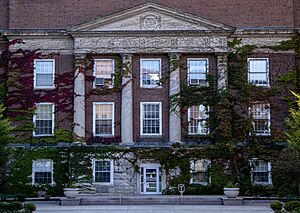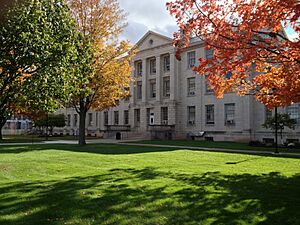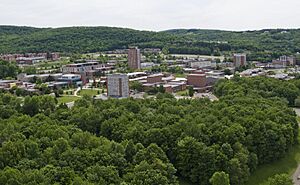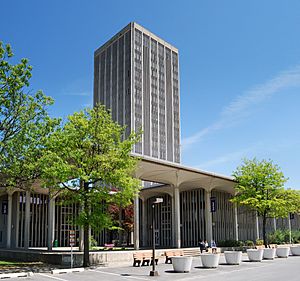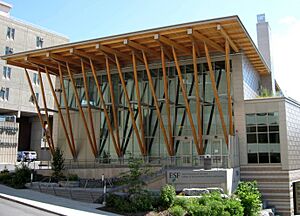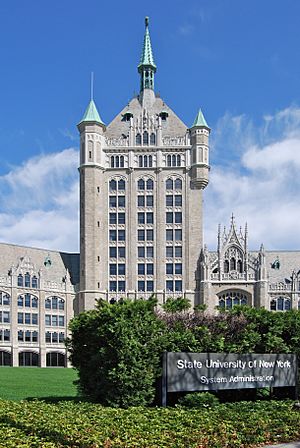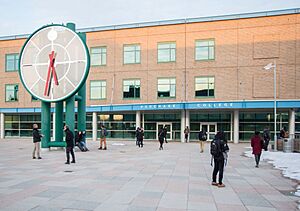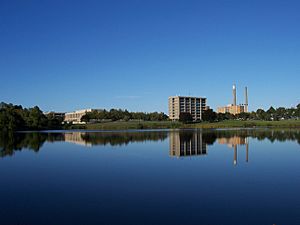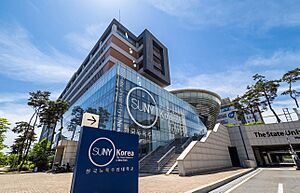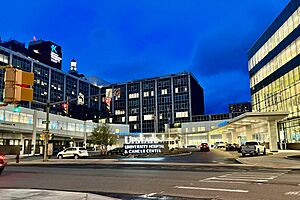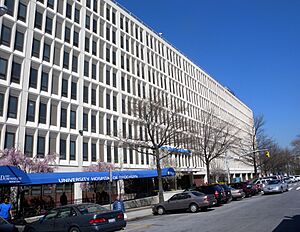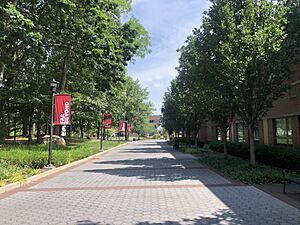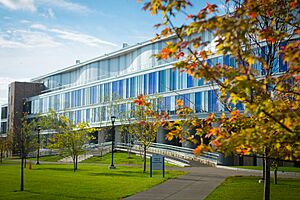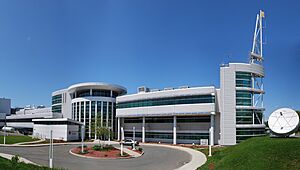State University of New York facts for kids
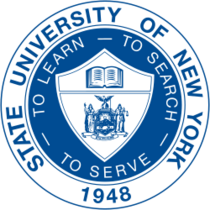 |
|
| Motto | To learn, to search, to serve |
|---|---|
| Type | Public university system |
| Established | 1948 |
| Endowment | $4.84 billion (2022) |
| Budget | $13.37 billion (2022) |
| Chairman | Merryl Tisch |
| Chancellor | John King Jr. |
| Vice-Chancellor | Robert Megna |
| Provost | Tod Laursen |
|
Academic staff
|
32,496 |
| Students | 363,612 (fall 2022) |
| Undergraduates | 319,011 (fall 2022) |
| Postgraduates | 44,601 (fall 2022) |
| Location |
,
United States
|
| Campus | 64 campuses |
| Colors | Blue and Gray |
 |
|
The State University of New York (SUNY /ˈsuːni/ SOO-nee) is a huge group of public colleges and universities in New York State. It's like a big family of schools!
Led by Chancellor John B. King, SUNY has many employees and offers thousands of different study programs. It has a large budget to help students learn and grow. Some of its most well-known universities are SUNY Stony Brook on Long Island and SUNY Buffalo in western New York. Other important research universities include SUNY Binghamton and SUNY Albany.
SUNY's largest campus is the SUNY College of Environmental Science and Forestry. It has 25,000 acres of land. Right next to it is the State University of New York Upstate Medical University. This medical university is the biggest employer in the SUNY system.
The State University of New York started in 1948. Governor Thomas E. Dewey helped create it. This happened after a special group studied the need for a state university. Governor Nelson A. Rockefeller later helped SUNY grow a lot. He was very interested in building new SUNY schools. Since 1978, SUNY's main offices have been in Albany. They also have smaller offices in Manhattan and Washington, D.C..
SUNY includes almost all of New York State's public colleges. The only other big public university system is the City University of New York (CUNY).
Contents
History of SUNY
New York was one of the last states to create a public college system. Before SUNY, most colleges were private. The state did support education in other ways. The oldest college now part of SUNY is SUNY Potsdam. It started in 1816 as the St. Lawrence Academy.
In 1835, the state wanted to train more public school teachers. They chose certain schools to help with this. St. Lawrence Academy was one of them. Later, Potsdam became a special school for teachers in 1867.
On May 7, 1844, the state decided to open the first college just for teacher education. This was the Normal School in Albany. In 1865, Cornell University, a private school, became New York's "land grant college." This meant it received state support for certain programs. By 1894, the state directly funded four of Cornell's colleges.
A special group studied New York's colleges from 1946 to 1948. They found that many private colleges were unfair. They didn't accept all New Yorkers. Because of this, the group suggested creating a public state university system. In 1948, a law was passed to create SUNY. It was built on the teacher-training schools that already existed.
In 1953, SUNY made a big decision. It banned all national fraternities and sororities from its campuses. This ban lasted until 1977. The goal was to fight unfair treatment based on race or religion. Many national groups at the time had rules that were not fair. The courts agreed that SUNY had the right to make this rule.
In 1986, L. Eudora Pettigrew became the first African-American college president in the SUNY system. She became president of SUNY Old Westbury.
Even though it started late, SUNY grew very quickly. This happened when Samuel B. Gould was Chancellor and Nelson A. Rockefeller was Governor. Governor Rockefeller was very involved in designing new SUNY buildings. He also helped the private University of Buffalo join the SUNY system. It became the public State University of New York at Buffalo.
How SUNY is Organized
SUNY is managed by a group called the State University of New York Board of Trustees. This board has eighteen members. Fifteen of them are chosen by the Governor. The student leader of all SUNY students is also on the board. The board chooses the Chancellor, who is like the CEO of SUNY.
New York State helps pay for the SUNY system. This makes college more affordable for people who live in the state. Students from other states and countries also attend SUNY. However, they pay higher tuition fees.
There are many different types of colleges in the SUNY system. They offer a wide range of subjects. SUNY groups its campuses into four main types:
- University Centers: These are large universities that offer many advanced degrees, including doctorates.
- Comprehensive Colleges: These offer a wide range of bachelor's and master's degrees.
- Technology Colleges: These schools focus on hands-on learning and technical skills.
- Community Colleges: These offer two-year programs and help students prepare for jobs or transfer to a four-year college.
SUNY also includes "statutory colleges." These are state-funded colleges located within other universities. For example, some colleges at Cornell University and Alfred University are part of SUNY. New York residents at these colleges pay lower, state-subsidized tuition.
It's important to know that SUNY and the City University of New York (CUNY) are different. Both get money from New York State. Also, SUNY is not the same as the University of the State of New York (USNY). USNY is a larger organization that oversees almost all education in New York State.
SUNY Leaders: Presidents and Chancellors
Here are the people who have led the State University of New York:
| No. | Image | Executive | Title | Term | Notes |
|---|---|---|---|---|---|
| 1 | Alvin C. Eurich | President | January 1, 1949 – August 31, 1951 | ||
| – | Charles Garside | Acting President | September 1, 1951 – March 31, 1952 | ||
| 2 | William S. Carlson | President | April 1, 1952 – September, 1958 | ||
| 3 | Thomas H. Hamilton | President | August 1, 1959 – December 31, 1962 | ||
| – | J. Lawrence Murray | Acting Chief Administrative Officer | January 1, 1963 – August 31, 1964 | ||
| 4 | Samuel B. Gould | President | September 1, 1964 – January 11, 1967 | ||
| Chancellor | January 12, 1967 – August 30, 1970 | ||||
| 5 | Ernest L. Boyer | Chancellor | September 1, 1970 – March 31, 1977 | ||
| – | James F. Kelly | Acting Chancellor | April 1, 1977 – January 24, 1978 | ||
| 6 |  |
Clifton R. Wharton, Jr. | Chancellor | January 25, 1978 – January 31, 1987 | |
| – | Jerome B. Komisar | Acting Chancellor | February 1, 1987 – July 31, 1988 | ||
| 7 | D. Bruce Johnstone | Chancellor | August 1, 1988 – February 28, 1994 | ||
| – | Joseph C. Burke | Interim Chancellor | March 1, 1994 – November 30, 1994 | ||
| 8 | Thomas A. Bartlett | Chancellor | December 1, 1994 – June 30, 1996 | ||
| – | John W. Ryan | Interim Chancellor | July 1, 1996 – April 20, 1997 | ||
| 9 | Chancellor | April 21, 1997 – December 31, 1999 | |||
| 10 |  |
Robert L. King | Chancellor | January 1, 2000 – May 31, 2005 | |
| – |  |
John R. Ryan | Acting Chancellor | June 1, 2005 – December 19, 2005 | |
| 11 | Chancellor | December 20, 2005 – May 31, 2007 | |||
| – | John B. Clark | Interim Chancellor | June 1, 2007 – December, 2008 | ||
| – | John J. O'Connor | Officer-in-Charge | December 22, 2008 – May 31, 2009 | ||
| 12 | Nancy L. Zimpher | Chancellor | June 1, 2009 – September 4, 2017 | ||
| 13 |  |
Kristina M. Johnson | Chancellor | September 5, 2017 – August 31, 2020 | |
| 14 |  |
Jim Malatras | Chancellor | August 31, 2020 – January 14, 2022 | |
| – | Deborah F. Stanley | Interim Chancellor | January 15, 2022 – January 9, 2023 | ||
| 15 |  |
John King Jr. | Chancellor | January 9, 2023 – Present |
Student Voice in SUNY
Students at SUNY have a say in how the system is run. The SUNY Board of Trustees includes a student member who can vote. This student is also the President of the Student Assembly of the State University of New York (SUNYSA). SUNYSA is the official student government for all SUNY schools.
In the 1970s, students worked hard to get voting rights on college boards. By 1979, students at almost all SUNY schools had full voting rights. This means students can help make important decisions for their colleges.
SUNY Libraries
The SUNY Libraries Consortium (SLC) is a group that helps all the libraries in the SUNY system. They work together to share resources and support students.
SUNY Campuses Around the World
Most SUNY colleges are in New York State. However, there are a couple of exceptions. Jamestown Community College has a center in Pennsylvania. Also, SUNY Korea opened in 2012 in Incheon, South Korea. It offers programs from Stony Brook University and the Fashion Institute of Technology.
SUNY's only law school is the University at Buffalo School of Law.
Doctoral Degree Granting Institutions
These are schools where students can earn advanced degrees, including doctorates.
University Centers
- University at Albany
- Binghamton University
- University at Buffalo (a main university)
- Stony Brook University (a main university)
Specialized Doctoral Degree Granting Institutions
- Upstate Medical University
- Downstate Health Sciences University
- College of Environmental Science and Forestry
- College of Optometry
- Polytechnic Institute
- One college at Alfred University:
- New York State College of Ceramics
- Four colleges at Cornell University:
- College of Agriculture and Life Sciences (CALS)
- College of Human Ecology
- College of Veterinary Medicine
- School of Industrial and Labor Relations
University Colleges
- Buffalo State University
- Empire State University
- SUNY Purchase
- SUNY Geneseo
- SUNY Oswego
- SUNY Potsdam
- SUNY Cortland
- SUNY Oneonta
- SUNY Fredonia
- SUNY New Paltz
- SUNY Plattsburgh
- SUNY Brockport
- SUNY Old Westbury
Technology Colleges
- Alfred State College
- Farmingdale State College
- SUNY Morrisville
- SUNY Canton
- SUNY Cobleskill
- SUNY Delhi
- SUNY Maritime College
Community Colleges
- SUNY Adirondack
- SUNY Broome
- Cayuga Community College
- Clinton Community College
- Columbia-Greene Community College
- Corning Community College
- Dutchess Community College
- SUNY Erie
- Fashion Institute of Technology
- Finger Lakes Community College
- Fulton-Montgomery Community College
- Genesee Community College
- Herkimer County Community College
- Hudson Valley Community College
- Jamestown Community College
- Jefferson Community College
- Mohawk Valley Community College
- Monroe Community College
- Nassau Community College
- SUNY Niagara
- North Country Community College
- Onondaga Community College
- Orange County Community College
- Rockland Community College
- Schenectady County Community College
- Suffolk County Community College
- Sullivan County Community College
- Tompkins Cortland Community College
- SUNY Ulster
- Westchester Community College
SUNY Medical Centers and Hospitals
The State University of New York runs three large medical centers. These centers combine a medical school with a university hospital. They are:
- Upstate University Hospital in Syracuse
- Stony Brook University Hospital in Stony Brook
- Downstate Medical Center in Brooklyn
A fourth medical school, the Jacobs School of Medicine and Biomedical Sciences in Buffalo, works with several hospitals in the area. SUNY also has the College of Optometry in New York City, which has its own eye clinic.
These medical centers are important for teaching new doctors. SUNY medical programs are highly rated. The hospitals also help many people who might not have good health insurance.
In 2020, more students wanted to apply to SUNY medical schools. To help more students, especially those from certain programs, SUNY started the Pre-Med Opportunity Program in 2021. This program helps students get ready for medical school.
SUNY's medical, health, and nursing schools train many health professionals each year. They educate a large number of the doctors, nurses, and dentists in New York State.
SUNY Facts and Figures
University Centers: Key Details
The State University of New York at Buffalo is the largest public university in New York by student numbers. It was started by former U.S. President Millard Fillmore. Buffalo has about 32,000 students and gets the most applications of all SUNY schools.
| Campus | Size (Acres) | Started | Students | Funds (Endowment) | Yearly Budget | Acceptance Rate | USNWR Rank (2024) | Sports Team Name | Sports League |
|---|---|---|---|---|---|---|---|---|---|
| Albany | 586 | 1844 | 17,544 | US$77.7 million | $0.54 billion | 53% | 133 | Great Danes | NCAA Div I America East |
| Binghamton | 930 | 1946 | 18,124 | US$117.8 million | $0.45 billion | 41% | 73 | Bearcats | NCAA Div I America East |
| Buffalo | 1,346 | 1846 | 31,923 | US$788.9 million | $3.53 billion | 60% | 76 | Bulls | NCAA Div I Mid-American |
| Stony Brook | 1,454 | 1957 | 26,814 | US$360.2 million | $2.09 billion | 44% | 58 | Seawolves | NCAA Div I CAA |
College Costs
Going to a SUNY school can be more affordable than many other public colleges in the U.S. For example, in 2017–2018, tuition at the University at Buffalo was much lower for New York residents.
New York State also offers free tuition for families who live in the state and earn less than $125,000 per year. To get this, students must study full-time and stay in New York for a few years after graduating. Many SUNY students also receive financial help from the government.
Medical school tuition at SUNY is also generally lower than the average cost of medical schools across the United States.
Research Funding at SUNY
SUNY schools receive a lot of money for research. This funding helps professors and students study new ideas and make discoveries. Here's how some SUNY schools rank in terms of research funding:
| School | National Science Foundation Funding Rank | Funding Dollars (USD) |
|---|---|---|
| Buffalo | 56 | $387,863,000 |
| Stony Brook | 97 | $225,712,000 |
| Albany | 134 | $137,759,000 |
| Binghamton | 161 | $76,005,000 |
| Downstate | 211 | $39,354,000 |
| Upstate | 222 | $34,286,000 |
| ESF | 259 | $21,239,000 |
| Optometry | 428 | $3,637,000 |
| Farmingdale | 441 | $3,213,000 |
| Buffalo State | 515 | $2,106,000 |
| Purchase | 567 | $1,433,000 |
| Brockport | 577 | $1,321,000 |
| Geneseo | 592 | $1,201,000 |
| Cobleskill | 625 | $908,000 |
| Cortland | 629 | $819,000 |
| Oswego | 632 | $725,000 |
Sports at SUNY Schools
Each school in the SUNY system has its own sports teams. The level of competition can be different at each school.
NCAA Sports Divisions
Division I
- The four main university centers compete in NCAA Division I. This is the highest level of college sports. Some of these schools also have football teams. The four Cornell colleges that are part of SUNY also compete in Division I as part of Cornell University.
Divisions II and III
- Most other SUNY colleges and technical schools compete in NCAA Division III. This division focuses more on academics than sports. The State University of New York Athletic Conference is a sports league made up entirely of SUNY colleges.
Other Sports Groups
- SUNY Environmental Science and Forestry is part of the United States Collegiate Athletic Association.
- Some community colleges compete in the National Junior College Athletic Association.
Sports Rivalries
There are many fun sports rivalries between SUNY schools!
- The Albany Great Danes and Binghamton Bearcats have a big rivalry. They are often called the I-88 Rivalry because they are at opposite ends of Interstate 88.
- In football, Albany and Stony Brook play each other every year in the "Battle for the Golden Apple."
- The University at Buffalo has basketball rivalries with two private colleges nearby: Canisius College and Niagara University.
- SUNY Oswego and SUNY Plattsburgh have a strong rivalry in Division III hockey.
- SUNY Cobleskill and SUNY Delhi have a rivalry in basketball and cross country.
- SUNY Oneonta and SUNY Cortland have a rivalry in almost every sport. They both have a red dragon as their team nickname, so their games are called the "Battle of the Red Dragons."
- There's even a unique rivalry between SUNY College of Environmental Science and Forestry and Finger Lakes Community College. Both schools have top teams in "woodsman" competitions, which involve traditional forestry skills.
University Police
The New York State University Police (NYSUP) are the police officers for the State University of New York (SUNY) system. There are about 600 officers and investigators who work at the 29 state colleges and universities.
University Police Officers (UPO) work to prevent crime and keep campuses safe. They also make sure state and local laws are followed. Officers talk to students, teachers, and staff about important topics like safety and crime prevention. They try to build good relationships with everyone on campus.
History of SUNY Security
In the 1960s, there were many protests and changes on college campuses. Because of this, SUNY decided to create a unified public safety program. The SUNY Security Force started on September 20, 1968. In 1974, the security force at the University at Albany became the first to carry weapons.
In the 1990s, some serious incidents led to calls for the security force to become full police agencies. On July 22, 1998, a law was signed to create the New York State University Police. This law meant that each campus police department would also work with nearby police agencies.
New York State University Police Today
The security forces officially became the NY State University Police on January 1, 1999.
In 2010, the New York State University Police at Stony Brook University became an "accredited" law enforcement agency. This means they meet very high standards for police work in New York State. Not all police agencies in New York meet these standards.
In 2015, a new law allowed University Police Officers to retire after 25 years of service. This change helped keep experienced officers working for SUNY. Before this, many young officers would leave to join other police agencies with better retirement plans.
See also
 In Spanish: Universidad Estatal de Nueva York para niños
In Spanish: Universidad Estatal de Nueva York para niños
- SUNY Press
- Education in New York (state)
- List of colleges and universities in New York (state)
- List of largest United States colleges by enrollment
- List of largest universities by enrollment


